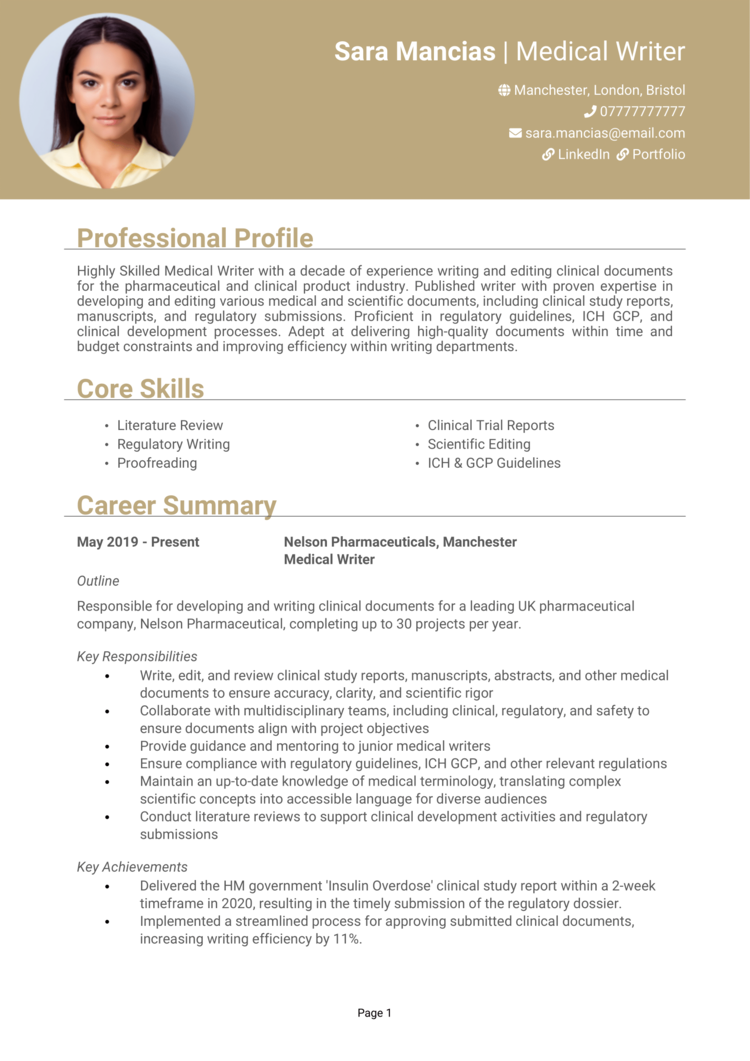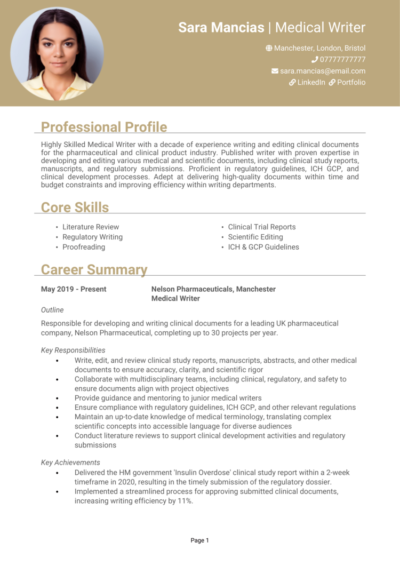You’re the bridge between complex medical science and clear, accessible communication, translating intricate data into compelling content.
Even great communicators sometimes struggle when it comes to marketing their own abilities: your CV needs to clearly articulate your knack for simplifying science and delivering precise, evidence-based content.
This guide and its Medical Writer CV example will help showcase your technical knowledge and your ability to communicate clearly and convincingly – exactly what employers are looking for.
Medical Writer CV example

How to write your Medical Writer CV
Discover how to craft a winning Medical Writer CV that lands interviews with this simple step-by-step guide.
A standout medical manuscript isn’t just about getting facts right; it’s about delivering information in a way readers can’t ignore. The same applies to your CV. Hiring managers need to immediately see that you combine scientific expertise with exceptional writing talent.
Forget generic lists of tasks – writing a CV should tell a concise story of your ability to handle complex medical topics and produce polished, accurate content under pressure. Whether you’re writing clinical research papers or regulatory documentation, this guide and its useful tips will ensure your CV captures your skills and experience in an impactful way.
How to structure and format your Medical Writer CV


Your CV should reflect your strengths as a Medical Writer: organised, clear, and easy to understand. Recruiters have limited time, so make their lives easier by presenting your experience, qualifications, and expertise in a logical structure.
Here’s the layout to follow:
- Name and contact details – Keep these personal details at the top so a potential employer can reach out to you: a photo is entirely optional.
- Profile – Kick things off with a concise overview of what makes you the ideal candidate for a Medical Writing role.
- Core skills – Briefly highlight your key abilities, such as scientific accuracy, regulatory knowledge, medical editing, or audience-focused writing.
- Work experience – List your previous medical writing roles in reverse chronological order, with your most recent first.
- Education & certifications – Detail the academic history that underpins your expertise, like your science degrees or medical writing qualifications.
- Additional info – Optionally, include professional memberships, publications, awards, or relevant hobbies.
A cluttered CV format makes recruiters’ jobs harder. Keep it concise, ideally no more than two pages in length, and use bullet points, clear headings, and a professional, easy-to-read font to guide their eyes effortlessly through your key information: don’t make the mistake of an overly-complex application.
Creating your Medical Writer CV profile


Your CV profile should clearly demonstrate why you’re an excellent Medical Writer: your unique combination of scientific knowledge and communication skill, your ability to adapt to different audiences, and your track record of delivering high-quality content on time. Ultimately, your aim is to convince recruiters that hiring you would make a positive impact for them.
Medical Writer CV profile examples
Profile 1
Detail-oriented Medical Writer with four years of experience in creating regulatory documents, clinical study reports, and medical publications. Skilled in interpreting complex scientific data, adhering to regulatory guidelines, and producing clear, well-structured content. Proficient in using medical writing software, referencing tools, and data analysis platforms. Passionate about translating scientific information into accurate, engaging, and accessible content.
Profile 2
Experienced Medical Writer with three years of expertise in developing educational materials, journal articles, and medical content for healthcare professionals and the public. Adept at researching medical literature, summarising clinical findings, and ensuring accuracy in medical communications. Skilled in writing for both technical and non-specialist audiences. Committed to producing high-quality medical content that informs and educates.
Profile 3
Results-driven Medical Writer with over five years of experience in medical communications, regulatory writing, and healthcare marketing. Skilled in developing clinical trial documentation, medical device reports, and pharmaceutical content. Proficient in Good Clinical Practice (GCP) guidelines, scientific manuscript preparation, and regulatory submissions. Dedicated to ensuring scientific accuracy and compliance in all medical content.
Details to put in your Medical Writer CV profile
Here’s what to include:
- Scientific background – Highlight your relevant qualifications or experience in medical or scientific fields.
- Writing expertise – Emphasise your strengths in creating clear, concise, and accurate medical content.
- Audience adaptability – Showcase your ability to write for different audiences, from healthcare professionals to patients.
- Regulatory awareness – Mention your experience with guidelines and regulatory compliance (e.g., FDA, EMA, MHRA).
- Career goals – Clearly indicate the type of medical writing role you seek, showing your enthusiasm and career direction.
How should you write a core skills section?


Show recruiters you have exactly the right prescription for their medical communication needs. Employers expect Medical Writers to blend strong scientific understanding with impeccable writing abilities. Clearly outline these essential skills to immediately capture recruiters’ attention.
Tailor this section to the role you’re targeting. Skip the generic skills: ‘team player’ isn’t as impressive as ‘expert medical copywriter’ – you should include skills such as scientific literature research, regulatory document preparation, clinical trial reporting, medical education writing, and editing proficiency.
What to include in a Medical Writer CV skills section
- Scientific Research and Literature Review – Conducting in-depth research on medical studies, clinical trials, and scientific publications.
- Medical Content Writing – Creating clear, accurate, and engaging content for research papers, medical journals, and healthcare publications.
- Regulatory and Compliance Documentation – Writing regulatory submissions, clinical study reports, and pharmaceutical documentation following guidelines like EMA, FDA, or ICH.
- Medical Editing and Proofreading – Reviewing and refining medical manuscripts, reports, and patient education materials for clarity and accuracy.
- Clinical Trial Reporting – Summarising clinical trial data, protocols, and results in a structured and compliant manner.
- Healthcare and Patient Education Materials – Developing easy-to-understand content for patients, healthcare providers, and the general public.
- Medical Marketing and Copywriting – Writing promotional content for pharmaceutical, biotech, and healthcare companies while adhering to industry ethics.
- Data Interpretation and Statistical Analysis – Understanding and presenting complex medical data in a clear and meaningful way.
- Compliance with Industry Standards – Ensuring all written materials align with regulatory guidelines such as GPP (Good Publication Practice) and CONSORT.
- Collaboration with Medical Professionals – Working with researchers, clinicians, and regulatory teams to ensure scientific accuracy and alignment with medical guidelines.
The best way to present work experience


Your experience should prove your medical writing credentials clearly and convincingly. Recruiters want to see measurable evidence of your ability to handle scientific complexity, meet tight deadlines, and produce high-quality medical content.
List your experience in reverse chronological order, clearly showing the type of documents you’ve written, the audiences you’ve reached, and the therapeutic areas you’ve covered. Include examples like published papers, regulatory submissions, training materials, or patient-facing educational content.
If you have less formal experience, focus on transferable skills or relevant freelance or academic writing projects.
Structuring your jobs

- Outline – Briefly describe the company or institution and your specific medical writing role.
- Responsibilities – Clearly list tasks such as authoring regulatory documents, clinical papers, or patient literature. Use action words like “authored,” “summarised,” and “edited.”
- Achievements – Highlight specific successes like publications, successful submissions, positive client feedback, or improvements in document clarity.
Job examples for Medical Writer
Medical Writer | VitaMed Research
Outline
Producing regulatory documents and clinical reports for a global medical research organisation, ensuring compliance with industry standards.
Responsibilities
- Authored clinical study reports, investigator brochures, and regulatory submission documents.
- Reviewed and summarised clinical trial data to support pharmaceutical product development.
- Ensured all documentation complied with ICH-GCP guidelines and regulatory agency requirements.
- Collaborated with medical experts, researchers, and statisticians to ensure scientific accuracy.
- Managed version control and document review processes to maintain high-quality submissions.
Achievements
- Contributed to the successful submission of three regulatory dossiers, expediting product approvals.
- Reduced review times by 20 percent through improved document structuring and clarity.
- Recognised for exceptional attention to detail and adherence to medical writing best practices.
Medical Writer | CCB Health Communication
Outline
Developing medical content and educational materials for a healthcare communications agency, supporting pharmaceutical clients and healthcare professionals.
Responsibilities
- Researched and wrote medical articles, white papers, and educational guides for healthcare providers.
- Translated complex medical research into clear, engaging, and accessible content for various audiences.
- Worked closely with medical experts to ensure accuracy and compliance with industry standards.
- Edited and proofread medical documents, ensuring clarity, consistency, and regulatory adherence.
- Managed multiple projects, meeting tight deadlines while maintaining content quality.
Achievements
- Increased reader engagement by 40 percent through improved readability and formatting strategies.
- Developed a series of medical training materials adopted by 10+ pharmaceutical companies.
- Recognised for delivering high-quality medical content ahead of project deadlines.
Regulatory Medical Writer | MediScript Global
Outline
Creating regulatory and clinical documentation for a multinational pharmaceutical company, ensuring compliance with industry guidelines and regulatory authorities.
Responsibilities
- Authored clinical trial protocols, patient information leaflets, and regulatory dossiers.
- Reviewed and synthesised clinical study data into structured, regulatory-compliant reports.
- Liaised with cross-functional teams, including clinical researchers and regulatory affairs specialists.
- Ensured documentation met EMA, FDA, and MHRA regulatory submission requirements.
- Conducted literature reviews to support evidence-based medical writing.
Achievements
- Played a key role in securing regulatory approval for two new pharmaceutical products.
- Improved document accuracy by 25 percent through enhanced data verification processes.
- Recognised for consistently delivering high-quality regulatory submissions within tight deadlines.
Writing your education section


Your academic background and any relevant professional training play a crucial role in validating your expertise as a Medical Writer. Keep the education section brief but comprehensive.
Clearly list your degrees, diplomas, and any specialist certifications or training you’ve completed. Degrees in life sciences, medicine, pharmacy, or related fields are highly valued. Additional training in medical communications, regulatory writing, or medical editing further strengthens your application.
Key qualifications for a Medical Writer
- BSc/MSc/PhD in Life Sciences or Medicine – Demonstrates strong scientific foundations.
- European Medical Writers Association (EMWA) Certificate – Highly respected training for medical writers.
- AMWA Essential Skills Certificate – Recognised qualification from the American Medical Writers Association.
- Regulatory Writing Training – Highlights expertise in preparing submissions for regulatory bodies.
- Medical Editing or Proofreading Certification – Shows your commitment to accuracy, clarity, and high-quality medical content.





